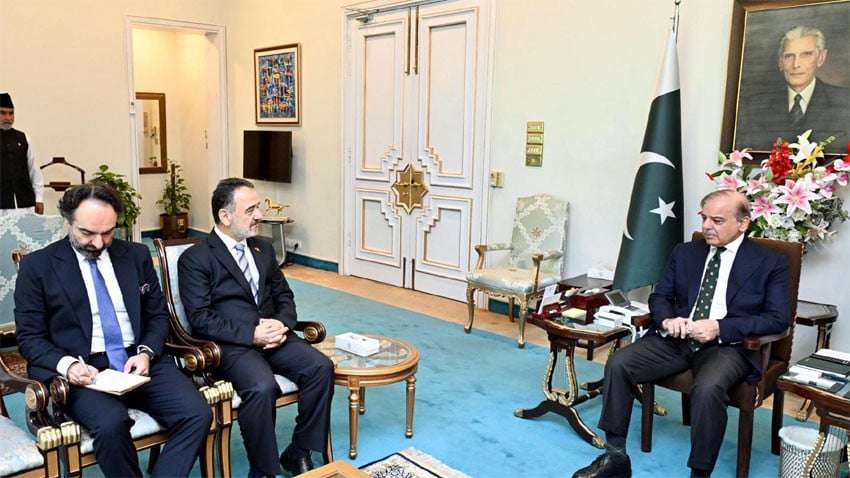PM Urges International Community to Honour Climate Aid Commitments Made at Prior Climate Conferences, Including COP28
Prime Minister Shehbaz Sharif raised concerns on Wednesday about the unmet financial pledges made at the previous two United Nations climate summits, COP27 and COP28. Addressing the ongoing COP29 conference in Baku, Azerbaijan, the prime minister stressed that the commitments made by developed countries to support climate action have yet to materialize.
He said that Pakistan incurred over $30 billion in damages due to catastrophic flooding in 2022, a consequence of climate change that continues to impact vulnerable countries globally. PM Shehbaz described the severe impacts on Pakistan, where thousands were displaced, and essential infrastructure, including schools, was destroyed. He noted that failing to act on these pledges could subject other countries to similar devastations in the future.
Impact of Climate Change on Pakistan
Severe Flooding and Economic Damage
Pakistan, among the ten countries most affected by climate change, has implemented strong resilience measures but requires global assistance to sustain these efforts. The country experienced devastating flooding in 2022, which resulted in over $30 billion in damages. Thousands of people were displaced, and critical infrastructure, including schools, roads, and hospitals, was destroyed. The prime minister highlighted these events to underscore the urgent need for international support and action.
Need for Global Assistance
In his opening remarks at the Climate Finance Roundtable Conference, organized by Pakistan in Baku, the prime minister highlighted that the developing countries would require an estimated $6.8 trillion by 2030 to fulfill even half of their current climate goals. “Our commitment to the climate must be accompanied by an equitable mechanism that ensures historic emitters contribute fairly, through financial and technical support to developing countries facing the brunt of climate impacts,” Shehbaz told the roundtable.
The IDC Proposal
Establishing a Structured Mechanism
The IDC proposal seeks to establish a structured mechanism to track and measure the delivery of climate finance commitments to developing nations. Under the IDC, the emitters would be accountable for fulfilling their commitments for mitigation and adaptation. Prime Minister Shehbaz said that the IDC framework could be “a defining tool for a fair and effective global response” to climate challenges. “Cooperation and multilateralism are the only paths forward,” he emphasized.
Calls for Urgent Reforms
The prime minister called on the world to present a unified response to climate finance. He stressed the need for urgent reforms to the financial architecture to ensure no country was left behind in the global response to climate change. The proposed reforms aim to create a more equitable system where the historical emitters of greenhouse gases provide financial and technical support to those most affected by climate change.
Global Engagements and Bilateral Meetings
Interaction with World Leaders
On the sidelines of the global gathering, Shehbaz interacted with several world leaders, and exchanged pleasantries with them besides discussing matters of mutual interest. Shehbaz was warmly received at the venue of the summit by Azeri President Ilham Aliyev and UN Secretary-General Antonio Guterres. He also had friendly exchanges with Turkish President Recep Tayyip Erdogan, Tajikistan President Imomali Rehmon, United Arab Emirates President Sheikh Mohamed bin Zayed Al Nahyan, Uzbek President Shavkat Mirziyoyev, and Kazakh President Kassym-Jomart Tokayev.
Discussions on Regional Climate Issues
In meetings with Bangladesh Chief Adviser Dr. Muhammad Yunus and Nepal’s President Ram Chandra Poudel, the prime minister highlighted the issue of rising temperatures in South Asia, the risks posed by rising sea levels, and the conservation of forests. These discussions emphasized the regional challenges posed by climate change and the need for collaborative efforts to address them.
Bilateral Relations and Climate Cooperation
The prime minister also discussed bilateral relations with British Prime Minister Keir Starmer and Danish Prime Minister Mette Frederiksen. They agreed on enhancing cooperation on key priorities so that the planet could be saved from the harmful impact of climate change. These discussions focused on strengthening partnerships and sharing knowledge and resources to combat climate change effectively.
The Way Forward
Emphasizing Global Solidarity
The prime minister’s address at COP29 underscored the critical importance of global solidarity in addressing climate change. He called for developed nations to fulfill their financial pledges and provide the necessary support to developing countries. By working together, the global community can create a sustainable future and mitigate the adverse effects of climate change.
Implementing the IDC Framework
The implementation of the IDC framework will be a crucial step in ensuring that financial commitments are met and that developing countries receive the support they need. This structured mechanism will hold emitters accountable and facilitate transparent tracking of climate finance.
Strengthening Resilience Measures
Pakistan will continue to strengthen its resilience measures and implement strategies to mitigate the impacts of climate change. However, international support remains essential to sustain these efforts and achieve long-term climate goals.
FAQs About Climate Finance and COP29
1. What financial commitments were made at COP27 and COP28?
At COP27 and COP28, developed countries committed to providing financial support to developing nations to help them mitigate and adapt to the impacts of climate change. These commitments have yet to be fulfilled, prompting calls for action at COP29.
2. How has climate change impacted Pakistan?
Pakistan has been severely affected by climate change, experiencing catastrophic flooding in 2022 that resulted in over $30 billion in damages. Thousands of people were displaced, and essential infrastructure was destroyed.
3. What is the IDC proposal?
The IDC proposal seeks to establish a structured mechanism to track and measure the delivery of climate finance commitments to developing nations. It aims to hold emitters accountable for fulfilling their commitments for mitigation and adaptation.
4. Why is global cooperation important in addressing climate change?
Global cooperation is essential because climate change is a global issue that requires collective action. By working together, countries can share knowledge, resources, and technology to effectively combat climate change and achieve sustainable development.
5. What are the next steps for implementing the IDC framework?
The next steps for implementing the IDC framework include establishing the mechanism, ensuring transparency in tracking climate finance, and holding emitters accountable for their commitments. This will require collaboration between developed and developing countries, as well as support from international organizations.



